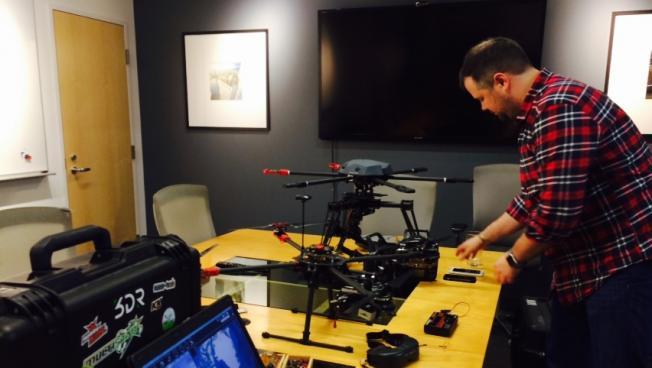How a group of drone racers are hoping to use their big events to educate others
Drone enthusiast Sean Tierney inspect his drones.
If you happened to pick up one of those free-flying drones during the holidays, the Federal Aviation Administration says you should be registered with the government.
As of Monday, drone owners who aren’t registered could face penalties. More than 337,000 drone owners have registered with the FAA so far — and about 300 of them are planning one of the biggest drone events ever — this spring in Boston.
“It’s a flying version of NASCAR — [that's] really the best way to explain it,” says Sean Tierney, a programmer who’s been spending his own time and money building and flying drones for about five years. “You feel like you’re flying. I heard someone explain it the other day — it’s like as close as getting to being in Star Wars as you can be, right now.”
Enthusiasts like Tierney are doing what they can to bring order to the drone galaxy. They’re concerned that as the number of drone owners grows, someone will do something dumb — something that puts people in danger or prompts the government to increase oversight and craft more regulations. So, they’re getting organized. They’re recruiting members to the new US Drone Racing Association, and they’re drumming up enthusiasm for big events, like one they’re planning in Boston in May.
An event like that — a NASCAR for drones — is an opportunity to change the national conversation around drones, says Dave Shevett, a founding member of the US Drone Racing Association.
“When I say I race drones — and I’ve had this happen many times when I sit down to talk to somebody — they say ‘Hey, what’d you do this weekend?’ ‘Oh I was racing my drone.’ ‘They say … oh I hate those things, they should all be banned,’” Shevett says. “And I’ll turn to them and say ‘Why?’ And they’ll go ‘It’s an invasion of privacy.’ And I’ll say ‘So are cameras, why don’t we ban all the cameras?’ ‘Well it’s different.’ ‘Why?’ ‘Because of how it’s used.’ Ah. Now we’re talking.”
That’s why Shevett wants to educate new owners about how to use drones properly and legally. Racing events are a good way to bring people in and give them a safe environment to learn.
“The problem right now is the jury’s still out as to whether [drone] racing will become a big sport or have a big following,” Shevett says. “From a spectator standpoint, it’s boring as dirt to watch. So how do you get a stadium full of people to watch a drone race? We’re not sure yet.”
There’s also the problem of logistics. Tierney and other organizers of this spring's race are still trying to find a place to hold it. In an email, the Massachusetts Emergency Management Agency said local, state and national public safety officials should all have a say in the location and planning of a drone race. Tierney says he’s been working with those agencies.
“We’re also dealing with insurance issues and some other stuff, because some places don’t want us to be flying,” he says. “They’re worried about people attending, and they’re worried about their property. Which are all valid points. Anything could go wrong.”
But a lot could go right — as far as marketing and sponsorships. Across the country, big companies are getting interested in advertising at these events and recruiting talented fliers. Drone racing could have a huge future. Or, Tierney says, it could be quashed in its infancy.
“It all comes down to who’s going to do the next dumb thing and get it shut down,” he says. “Unfortunately, but that’s kind of the reality we live with. We’re just waiting for the next shoe to drop.”
Until then, Tierney says he and others will keep racing.
A version of this story first appeared on WGBHNews.org.
